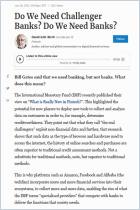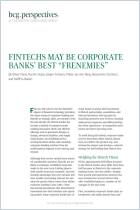
Recommendation
Start-ups rise and fall, and disrupters are often disrupted. It is no different for the neobanks in Europe, whose vision of a better, more consumer-centric financial experience seems to have come undone. In this informative analysis, financial journalist David Dawkins looks at how the COVID-19 pandemic has thrown cold water on these upstarts’ aspirations, even if their design would appear to lend itself nicely to post-pandemic norms.
Summary
About the Author
David Dawkins is journalist at Forbes magazine.


















Comment on this summary